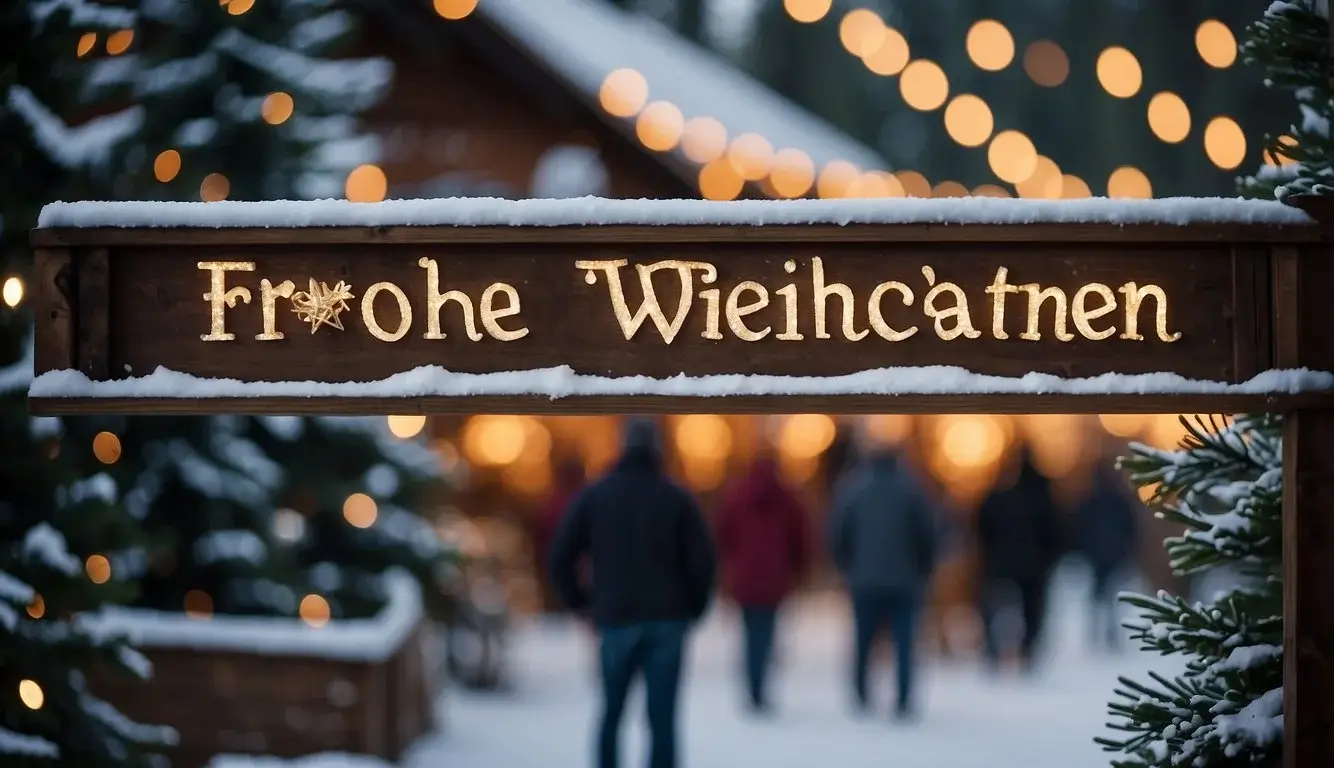How to Express Merry Christmas in German? Reveals an endearing cultural detail I’ve explored for you, where ‘Frohe Weihnachten’ acts as the captivating greeting to enrich your festive lexicon.
Key Takeaways
- In German, saying “Frohe Weihnachten” is how to wish someone a merry Christmas.
- Using this greeting demonstrates respect for German traditions and language.
- Learning holiday phrases contributes to a deeper cultural understanding.
How to Say ‘Merry Christmas’ in German

In my experience traveling through German-speaking countries during the festive season, I’ve learned that there are a few key phrases to express holiday greetings in German.
Common Phrases and Their Usage
“Frohe Weihnachten” is the most commonly used phrase for “Merry Christmas” in Germany, Austria, and Switzerland. When I want to spread festive cheer, I use this phrase. Another heartwarming greeting I often use is “Fröhliche Weihnachten,” which carries the same meaning. For more religious or heartfelt wishes, I might say, “Gesegnete Weihnachten,” wishing someone a blessed Christmas.
Here are the phrases for easy reference:
- Frohe Weihnachten – Merry Christmas
- Fröhliche Weihnachten – Joyous Christmas
- Gesegnete Weihnachten – Blessed Christmas
During less formal or more general festive occasions, I opt for phrases like “Frohes Fest” or “Schöne Feiertage,” which translate to “Happy Celebration” and “Beautiful Holidays,” respectively. When wishing someone well for the upcoming new year, I use “Frohe Feiertage,” which can be interpreted as “Merry Holidays.”
Regional Variations and Pronunciation
The pronunciation of these greetings can vary slightly in different regions. In my experience, the standard German pronunciation I’ve encountered in places like Berlin and Munich involves a clear, rolling “r” and a strong emphasis on the vowels. The phrase “Frohe Weihnachten,” for example, is pronounced as [fro:-uh vyn-nahkh-ten].
Due to regional dialects, there may be subtle variations in pronunciation in Austria and parts of Switzerland. However, the standard High German phrases are widely understood. When I visited Vienna, the pronunciation was very similar to that of Germany but with a slightly different intonation.
I’ve noticed that each German-speaking country has its charm in the way it expresses its Christmas greetings, but they all understand the standard “Frohe Weihnachten.” It’s a wonderful way to connect with people during the holiday season—wishing joy, peace, and blessings in a language that is so culturally rich.
Cultural Insights into Christmas in Germany

As someone who has experienced the warmth and charm of Christmas in Germany, I’m thrilled to share some of the cultural nuances that make the holiday season there unique. From the traditional greetings to the special treats and decorations that adorn the festive markets, each element adds to the joyous spirit of Weihnachten.
Traditional Celebrations and Greetings
In Germany, the Christmas season, or Weihnachten, is steeped in centuries-old traditions. Advent marks the beginning of the holiday season, with families often gathering to light candles on the Adventskranz—an Advent wreath with four candles symbolizing the four weeks leading up to Christmas. One candle is lit each Sunday, building anticipation.
The sense of joy and preparation extends to Christmas Eve, known as Heiligabend, which is the heart of the celebration. This night, it is a custom for Christkind, a symbolic childlike figure representing the infant Jesus, to bring gifts to children rather than Santa Claus. Saying “Frohe Weihnachten” fills the air with good cheer, conveying warm wishes for a Merry Christmas.
Holiday Delicacies and Decorations
No German Christmas is complete without a visit to the Christmas markets, where the fragrance of mulled wine, or Glühwein, mingles with the aroma of Bratwurst sizzling on the grill. Here, I often indulge in Lebkuchen and Weihnachtsplätzchen—traditional German Christmas cookies that are as delicious as they are decorative.
| German Treats | Description |
|---|---|
| Lebkuchen | A gingerbread-like baked treat, often heart-shaped and covered with a sweet glaze. |
| Weihnachtsplätzchen | An assortment of festive cookies, ranging from simple buttery biscuits to jam-filled delights. |
The decorations are a sight to behold, with Christmas trees, or Tannenbäume, sparkling with Christmas lights. Handcrafted ornaments and the Feuerzangenbowle, a fire-tongs punch often shared during gatherings, add to the ambiance. I always find myself mesmerized by the beauty of the season, where centuries-old German Christmas traditions like the Adventskranz and Nikolaus—the precursor to Santa Claus, who visits on December 6th—bring people together in a joyful prelude to Neues Jahr, the New Year.
FAQ – How to Say Merry Christmas in German
If you enjoyed reading about
If you enjoyed reading about How to Say Merry Christmas in German check out our other articles:
Neighborhood Event Ideas 2024: Fun and Engaging Activities for All Ages
Spring Event Ideas 2024: A Guide to Hosting Memorable Gatherings
Outdoor Event Ideas 2024: Fun and Engaging Activities for All Ages
Fun Social Events 2024: Top Picks for Unforgettable Experiences
Women’s Event Ideas 2024: Inspiring and Fun Gatherings for Every Occasion
Feel free to also check out our other Articles from the category “Christmas“ and don’t forget to follow us on Pinterest.
